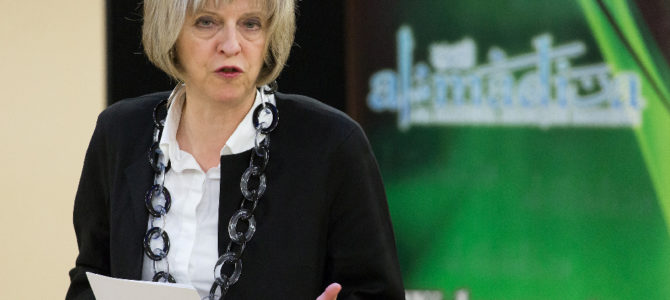
Last November 8, Hillary Clinton lost the U.S. presidential election in an amazing upset by Donald Trump. She endured her shock defeat on a date prescribed by federal law. What if Hillary Clinton didn’t have to run a campaign last autumn, but called one anyway—then came up short?
That’s essentially what happened last night across the Atlantic, where British Prime Minister Theresa May gambled big—and lost. She called a surprise “snap election” earlier this spring hoping to expand her parliamentary majority, and gain additional leverage in her “Brexit” negotiations with the European Union. Instead, when the votes came in, her Conservative Party lost both votes and seats in Parliament. While the Conservatives remain the largest party in Parliament—albeit short of an outright majority—the election result cannot be viewed as anything other than a defeat.
The result looks that much more stunning when considering May’s foremost opponent: a Labour Party led by Jeremy Corbyn, a leftist who makes Sen. Bernie Sanders look moderate. Corbyn has opposed both military force and the use of nuclear weapons; more than 80 percent of his party’s own members of Parliament supported ousting him as leader, but the grassroots party returned him anyway. A university professor called Corbyn’s election as Labour leader “an act of stupidity unparalleled since Caligula appointed his horse to the Roman Senate.”
Losing This Big Took Some Effort
How could May, thought a shoo-in to win a landslide only a month ago, flop so resoundingly against an opponent so weak?
As with Hillary Clinton’s loss to Trump, it took some effort. May, like Clinton, played a safe campaign, in which she didn’t seem comfortable, while Corbyn relished interactions with voters and constituents. Her campaign manifesto prompted a U-turn from the prime minister mere days after its launch, angering traditional Conservative supporters and giving the party a bumbling appearance, at a time when May had promised to provide strong and stable leadership.
There were other factors, too. In the wake of last year’s referendum to exit the European Union, the UK Independence Party vote collapsed. It appears some working-class voters who voted UKIP at the last election shifted back to Labour instead of voting Conservative.
Turnout rose in newly won Labour areas, suggesting Corbyn’s brand of hardcore socialism and “pork-barrel politics”—including pledges to abolish tuition fees—motivated young people to turn out. And as Harold Macmillan famously warned, “Events, dear boy, events” may have conspired against the prime minister. The terror attacks in Manchester and London Bridge, coupled with Trump’s tweets against London Mayor Sadiq Khan, may have played a role in the campaign’s final days.
What Happens Next?
Although voters may have punished her for going to the country early, another plebiscite could be in the cards. In her speech early Friday morning, the prime minister promised a “period of stability,” suggesting a possible transition, followed by a third general election. With the Conservatives operating a minority government, it seems unlikely that government could last for the full five-year lifetime of a Parliament.
That said, May may not remain long enough to make those decisions herself. Early reports suggest a high likelihood that the prime minister could step down as Conservative leader, triggering the second leadership election for the party in as many years. (It is a demonstration of the election’s shock result that Corbyn could well outlast May as party leader—an outcome few previously would have thought possible.)
However, one election seems unlikely to occur any time soon: A second referendum on Scottish independence. Scotland provided one of the election’s many ironies when a weakening of Scottish National Party support led to a gain of 11 Conservative MPs, propping up the party after losses elsewhere. With Labour also benefitting from the SNP weakness, and Scottish voters seemingly taken a dim view of a “never-endum” debate on independence, the union of England and Scotland apparently remains secure—for the time being.
As to Britain’s “other” union—its impending divorce from the European Union—the nature of that relationship seems less clear. With the Conservatives having less room for maneuver in the coming Parliament, the next prime minister—whether May or someone else—could end up playing a weakened hand in negotiations with Brussels. That’s the exact opposite scenario of the one May envisioned six weeks ago—another surprising outcome from Thursday’s surprising election.









